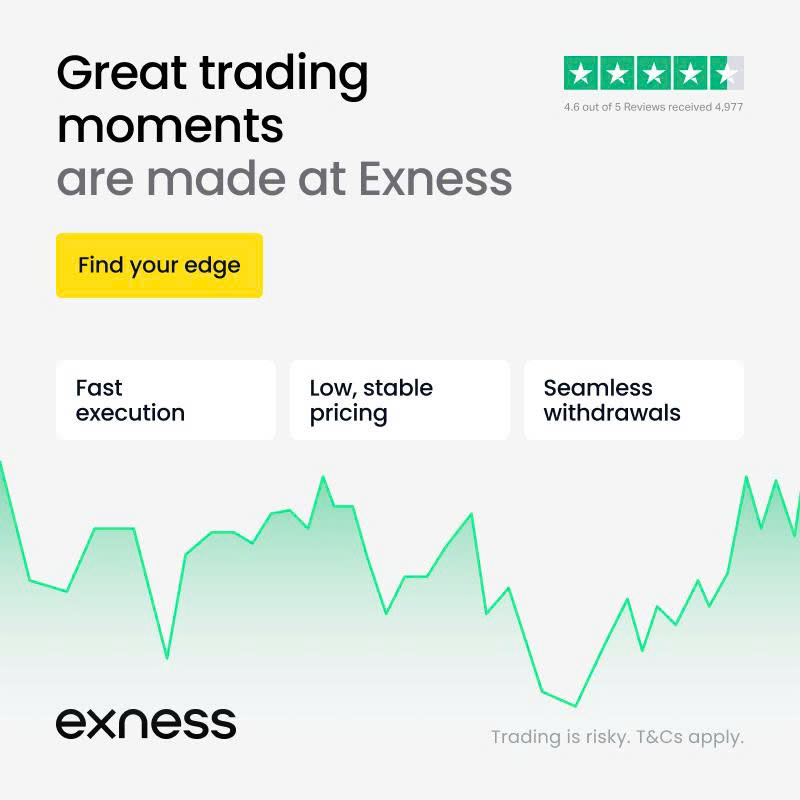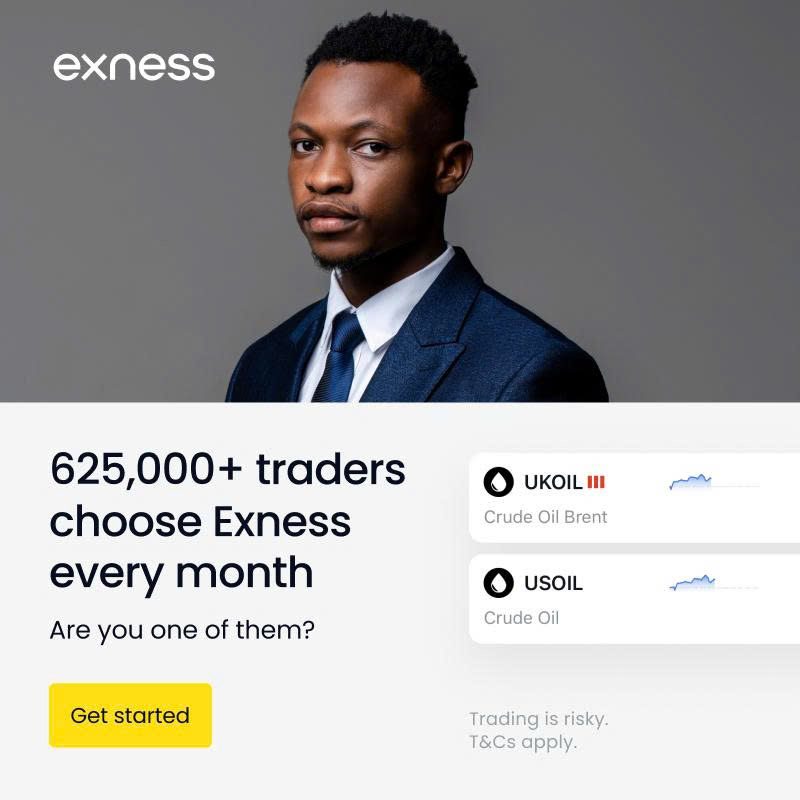
6 minute read
Exness Trading Charges How Much? Does It Cost to Trade on Exness?
from Exness
by Exness Blog
When trading with Exness, one of the first questions most traders ask is: How much does it actually cost to trade here? The answer depends on various factors, including your account type, trading instrument, spread, commission, and swap fees. In this guide, we’ll break it all down clearly so you’ll know exactly what you’re paying—and why.

✅ Trade with Exness now: Open An Account or Visit Brokers 👈
Exness Trading Costs: The Short Answer
Exness charges traders primarily through spreads, commissions, and overnight swap fees. For most account types, spreads are the only cost, with no commission involved. However, for professional accounts like Raw Spread or Zero, you’ll encounter lower spreads but pay a commission per lot traded.
In short:
· Standard Accounts: No commission, wider spreads.
· Raw Spread & Zero Accounts: Tight spreads or zero spread, but commission charged per lot.
· Swap fees: May apply if you hold positions overnight.
· No deposit/withdrawal fees from Exness.
Let’s dive deeper into each of these charges so you know exactly what to expect.
1. Spread – The First Cost You Encounter
The spread is the difference between the bid and the ask price. This cost is included in every trade and is automatically charged when you enter a position.
How much is the spread on Exness?
It depends on:
· The account type:
o Standard: Spreads start from around 0.3 to 1.5 pips on major pairs.
o Raw Spread: Spreads can be as low as 0.0 pips, ideal for scalping and day trading.
o Zero Account: Offers zero spreads on major pairs most of the time.
· Market conditions:
o During high volatility (like news releases), spreads can widen.
o During liquid times (e.g., London/New York overlap), spreads are usually at their tightest.
2. Commission – Only on Some Accounts
If you choose a Raw Spread or Zero Account, you’ll pay a commission per lot, instead of wide spreads. This is ideal for traders who prefer transparency and lower execution costs.
How much is the commission per lot?
· Raw Spread account: Exness charges up to $3.5 per side per lot, which totals $7 per round-turn lot.
· Zero account: Commission varies depending on the instrument, but for major FX pairs, it can be as low as $0.2 per lot and goes up depending on the asset class and market.
This commission is fixed and predictable, which is helpful for cost-sensitive traders or those running automated systems.

✅ Trade with Exness now: Open An Account or Visit Brokers 👈
3. Swap Fees – Overnight Charges
Swap, or rollover fees, are charges applied when you hold a position overnight. It’s calculated based on interest rate differences between the two currencies being traded and can either be positive or negative depending on the direction of the trade.
Does Exness charge swaps?
Yes—but with a twist.
Exness offers Swap-Free accounts for traders from specific countries or religions (especially Muslim countries, in accordance with Islamic finance rules). For these accounts, swaps are not charged, but a fixed fee may apply after a grace period of several days.
How to know your swap cost?
You can check swap rates:
· Directly in your MT4/MT5 platform (right-click the instrument > "Specifications")
· Or on the Exness website under each instrument's trading conditions.
Swap charges are applied at midnight server time, and a triple swap fee is applied on Wednesdays to account for the weekend rollover.
4. Other Potential Fees
Exness is transparent about its pricing structure, and in most cases, there are no hidden fees. Still, here are other costs to keep in mind:
· Inactivity Fees: Exness does not charge inactivity fees. This is great for casual or long-term traders.
· Deposit/Withdrawal Fees: Exness does not charge any fees for deposits or withdrawals, although your payment provider may charge.
· Conversion Fees: If your account currency is different from your payment method or trading instrument, you may incur currency conversion costs from third parties.
5. Trading Instruments and Their Costs
Exness offers trading in forex, metals, cryptocurrencies, indices, energies, and stocks. The cost to trade varies significantly based on the asset class.
· Forex: Lowest spreads and commission, ideal for short-term traders.
· Cryptocurrencies: Higher spreads, no commissions.
· Indices & Energies: Moderate spreads; swap may apply.
· Stocks: Spreads and swap charges; available mostly on standard accounts.
Each asset class has its own fee structure, so check the instrument specifications before trading.
6. Leverage and Margin Impact on Trading Costs
Exness offers unlimited leverage for certain accounts under specific conditions. While leverage itself is not a fee, it directly affects your risk and capital exposure. Higher leverage reduces margin requirements but increases the size of your positions, which means:
· You may pay higher total commissions (if calculated per lot).
· Swap fees will be higher if you hold larger positions overnight.
· Profit and loss are magnified.
This isn’t a direct fee, but it's crucial to factor leverage into your cost/risk analysis.
7. How to Reduce Trading Costs on Exness
If you’re actively trading and want to keep costs low, here are some practical tips:
· Choose the right account type: If you’re scalping or trading in high volume, go with Raw Spread or Zero for lower spreads and predictable commissions.
· Trade during high liquidity hours: This reduces the risk of slippage and spread widening.
· Use a swap-free account if eligible.
· Avoid unnecessary overnight positions if swap fees are high.
· Monitor the instrument specifications before trading to understand cost structure.
· Use the Exness calculator to simulate trading costs before entering a position.
8. Transparency: One of Exness's Strongest Points
One reason why Exness is a popular broker globally is its transparency in pricing. All trading costs—spreads, commissions, and swaps—are clearly listed in the instrument specifications. Unlike some brokers, Exness doesn’t bury its fees in fine print or spring hidden charges on you after you start trading.
You also get access to a real-time margin and cost calculator, updated instrument pricing, and 24/7 support for billing-related queries.
Conclusion: Exness Trading Charges Are Competitive and Clear
So, how much does Exness charge to trade?
It depends on how you trade, which account type you choose, and which instruments you focus on. But in general:
· You can trade with zero commission on Standard accounts, at the cost of slightly wider spreads.
· Or choose tight spreads with low commission on Raw Spread and Zero accounts.
· Swap fees are charged on overnight positions but can be waived or fixed for swap-free accounts.
· Exness does not charge for deposits, withdrawals, or inactivity.
The bottom line is this: Exness offers one of the most cost-efficient, transparent trading environments in the retail brokerage space. Whether you’re a beginner trader or a professional scalper, you can tailor your cost structure to fit your strategy with minimal surprises.
If you want to calculate your exact trading cost before placing a trade, visit the official Exness calculator or check instrument specs directly in your trading platform.
✅ Trade with Exness now: Open An Account or Visit Brokers 👈
Read more:










